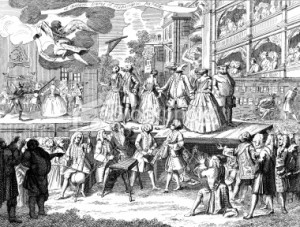
The Beggar’s Opera is a pointed example of unpretentious popular art long outliving the “serious” works of its day. In 1728, a rather unsuccessful English poet, John Gay, penned a satire of the upper class’s taste for Italian Opera, as well as the establishment politics of the day (then personified in First Lord of the Treasury, Robert Walpole). Using a kleptomaniac collection of Scottish and French folk-tunes, Gay conceived a fast-moving, tight-knit plot involving, instead of the usual operatic cast of Classical heroes and deities, the whores and thieves of the London slums. The logic of the plot leads inevitably to the hanging of the hero, MacHeath, but at the last minute The Beggar (who introduces the play and comments on the action) announces that a moral ending would demand a hanging, but, since the audience came to see a happy ending instead, Macheath is to be released. This kind of tongue-in-cheek sauciness pretty much sums up the play. Gay originally intended it to be performed a capella, but the producer insisted on bringing in a professional composer, Johann Prepusch, to tart it up with arrangements and an overture. It is usually performed in this version.
The result was enormously successful in its day, and has arguably had far more artistic influence than any of the high-toned dramas of the 18th century. The characters MacHeath, Lucy, and Polly became folk heroes. It has never been absent from boards for long. A London West End revival in 1920 ran to 1,463 performances! The play’s irreverence towards the powerful and its lampooning of corruption and injustice have attracted many political rebels. Gay’s attempt to produce a sequel was suppressed by the government. Wole Soyinka adapted it to Nigeria. Vaclav Havel produced a fascinating underground version in 1975, for which every participant was harshly punished. Australians have shifted the locale to Convict ships. A production last year placed it in a near-future apocalypse. I am loathe to include in the list Bertolt Brecht’s famous adaptation, The Three-penny Opera, since Brecht’s “rebel” credentials are entirely phony (he was, in fact, a cringing supporter of Communist Aristocracy, and an apologist for oppression and terror) — but that is probably the most famous adaptation, and Kurt Weill’s tunes are delightful.
But far more delightful is the original. I have two performances: an Old Vic production conducted by Malcolm Sargeant on vinyl and a 1991 production conducted by Jeremy Barlow. Both are good, but I prefer the more recent one.
“Since laws were made for every degree,
To curb vice in others, as well as me,
I wonder we han’t better company
Upon Tyburn Tree;
But gold from law can take out the sting;
And if rich men like us ere to swing,
‘Twould thin the land, such numbers to string
Upon Tyburn Tree!” –MacHeath, Act III, Air 67
0 Comments.